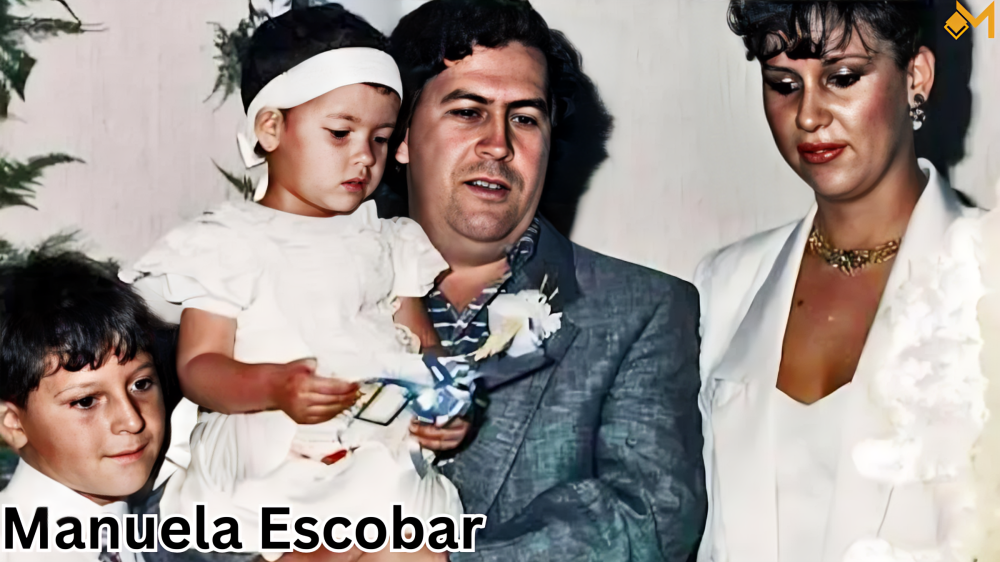Manuela Escobar, born in 1984, is the daughter of Pablo Escobar, the notorious Colombian drug lord whose empire once dominated the global cocaine trade. While people have extensively documented her father’s criminal activities, Manuela has kept her life largely private, overshadowed by her father’s legacy. This article delves into the life of Manuela Escobar, exploring her early years, the impact of her father’s criminal empire on her life, her journey after his death, and her current endeavors.
Early Life and Family Background
Manuela Escobar was born into one of the most infamous families in criminal history. Her father, Pablo Escobar, was the leader of the Medellín Cartel, a powerful drug trafficking organization that controlled a significant portion of the cocaine trade during the 1980s and early 1990s. Her mother, Maria Victoria Henao, married Pablo Escobar and played a crucial role in managing the family’s business affairs and protecting their public image.
Growing up in such a high-profile and dangerous environment, Manuela remained shielded from much of the outside world. Her father used ruthless tactics and amassed immense wealth, but he also deeply protected his family. Manuela’s childhood combined luxury with secrecy, as her father aimed to provide for his family while shielding them from the consequences of his criminal activities.
The Impact of Pablo Escobar’s Empire
The impact of Pablo Escobar’s criminal empire on Manuela’s life was profound. The Escobar family enjoyed a lifestyle of opulence and extravagance, with vast estates, luxury cars, and private jets. However, this wealth came at a significant cost. The constant threat of violence and assassination attempts was a daily reality for the Escobar family, and they lived under heavy security to protect themselves from rival cartels and law enforcement.
Manuela’s father was a highly controversial figure, and his actions had far-reaching consequences not only for Colombia but also for the international community. The violence and corruption associated with the Medellín Cartel created a climate of fear and instability. For Manuela, this meant growing up in an environment where safety and normalcy were elusive, and where her family’s reputation cast a long shadow over her own life.
Life During Pablo Escobar’s Reign
Despite the turmoil surrounding her family, Manuela enjoyed the comforts of extreme wealth during her early years. The Escobars owned numerous properties, including a lavish estate known as Hacienda Nápoles, which boasted a private zoo, amusement park, and exotic animals. These indulgences were part of the extravagant lifestyle that Pablo Escobar maintained, often flaunting his wealth in stark contrast to the poverty that afflicted many Colombians.
Manuela’s father was known for his attempts to maintain a semblance of normalcy for his children. He sought to shield them from the violence and criminality that defined his public life, providing them with the best education and opportunities he could offer. However, the constant danger and the need for secrecy meant that Manuela’s childhood was anything but ordinary.
The Fall of Pablo Escobar
The fall of Pablo Escobar occurred in December 1993 when Colombian National Police killed him in a shootout. His death ended the Medellín Cartel era and marked a major shift in drug trade power dynamics. For Manuela and her family, this event was a turning point that dramatically altered their lives.
Following her father’s death, Manuela’s family faced an intense period of upheaval. They were forced to leave Colombia due to the threats they faced from rival cartels and the stigma associated with their family name. This period was marked by uncertainty and instability as they sought refuge and struggled to adapt.
Life After Pablo Escobar
After Pablo Escobar’s death, Manuela and her family relocated to Germany, the U.S., and Europe. They lived under assumed identities and continued to live under the shadow of their past. The transition from a life of extreme wealth and security to one of relative obscurity was challenging.
Maria Victoria Henao, Manuela’s mother, faced legal and financial difficulties as well. In 2018, she was arrested in the United States on charges of money laundering and had her assets seized. Legal battles and public scrutiny added to Manuela’s challenges as she tried to rebuild her life.
Manuela Escobar’s Personal Journey
Manuela Escobar avoids the public eye, leading a private life away from media scrutiny and family fame. She maintains a low profile, focusing on personal development and normalcy despite her family’s challenges.
The challenges of growing up as the daughter of one of the world’s most infamous criminals have undoubtedly shaped Manuela’s perspective on life. Details about her life are scarce, but she has faced unique obstacles and a complex legacy.
Current Endeavors and Personal Life
In recent years, Manuela Escobar has remained out of the public eye, leading a relatively private life. She has avoided media attention and has not sought to capitalize on her family’s notorious history. Reports suggest she focuses on personal interests and strives to live away from her past’s shadows.
Maria Victoria Henao continues to face legal and financial challenges, affecting the family’s ability to live peacefully. Despite these difficulties, Manuela has reportedly sought to maintain a sense of normalcy for herself and her family.
The Legacy of Pablo Escobar and Its Impact on Manuela
The legacy of Pablo Escobar continues to influence perceptions of his family, including Manuela. The dramatic and violent history of the Medellín Cartel has led to a complicated legacy, with documentaries, books, and media portrayals often focusing on the sensational aspects of Escobar’s life. This has made it challenging for Manuela to escape the shadow of her father’s legacy and build her own identity.
However, Manuela’s efforts to live a private life and avoid the public eye reflect a desire to distance herself from the criminal history that defined her family’s past. Her choice to lead a more anonymous life is a testament to her desire to forge her own path and find personal fulfillment beyond the constraints of her father’s notoriety.
FAQs
1. Who is Manuela Escobar?
Manuela Escobar is the daughter of Pablo Escobar, the notorious Colombian drug lord. Born in 1984, she grew up in the shadow of her father’s criminal empire and has largely remained out of the public eye.
2. What was Manuela Escobar’s childhood like?
Manuela’s childhood was marked by luxury and secrecy due to her father’s wealth and criminal activities. Despite living in opulence, her family faced constant threats and violence, affecting her early years.
3. What happened to Manuela Escobar after her father’s death?
After Pablo Escobar was killed in 1993, Manuela and her family faced significant upheaval. They relocated multiple times and lived under assumed identities due to safety concerns and the stigma attached to their family name.
4. What is known about Manuela Escobar’s current life?
Manuela has maintained a low profile and avoided media attention in recent years. She has focused on living a private life away from the public spotlight and has not sought to capitalize on her family’s notoriety.
5. How has Pablo Escobar’s legacy affected Manuela Escobar?
Pablo Escobar’s criminal legacy has profoundly impacted Manuela’s life, creating challenges related to public perception and personal identity. Her efforts to live privately reflect her desire to distance herself from her father’s infamous history.
Conclusion
Manuela Escobar’s life story is a poignant reminder of the far-reaching consequences of Pablo Escobar’s criminal empire. While she has sought to distance herself from the public eye and the legacy of her father, her life remains intertwined with the broader narrative of her family’s history. Her experiences highlight the complexities of growing up in the shadow of a notorious figure and the challenges of navigating a path to personal stability and fulfillment.
Despite the difficulties she has faced, Manuela’s choice to lead a private life and avoid the media spotlight reflects a resilience and determination to build a life beyond the constraints of her family’s past. Her story, though less known than that of her father, offers a unique perspective on the impact of criminal legacy on family members and serves as a reminder of the personal toll of such a dramatic and turbulent history.
Sign up for our Daily newsletter
We'll be in your inbox every morning Monday-Saturday with all the day’s top business news, inspiring stories, best advice and reporting from Entrepreneur,

